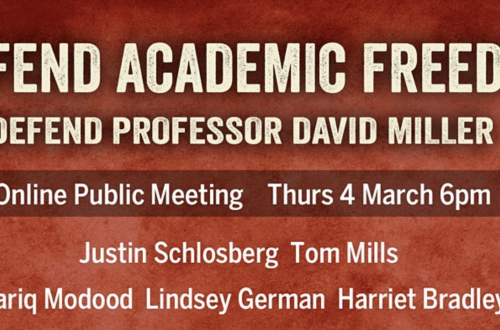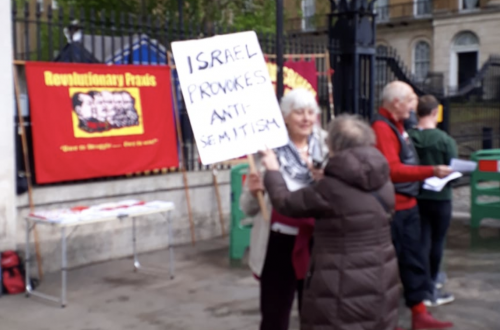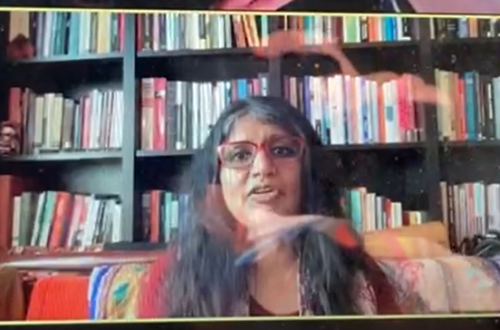This is a cross post by Luke Akehhurst from Labour List
I like Owen. He is a very bright, personable and decent chap. In terms of the Labour Hard Left he is the most talented polemicist and communicator they have had for a generation. I also know as Hackney North CLP Agent that he is not an armchair theorist but while he was living here rolled up his sleeves and did more than his fair share of canvassing and leafleting for Labour.
But his column this week in the Independent was execrable cobblers.
On the plus side Owen seems to firmly discount the idea of a left-of-Labour party emerging, which has been a matter of discussion, and doomed initiatives (Socialist Labour Party, Socialist Alliance, Respect, TUSC), ever since the New Clause IV was adopted by Labour in 1994, dropping a paper commitment to state ownership of the economy.
This is quite significant as Owen has been closely associated with the Labour Representation Committee, which the more paranoid amongst us saw as being a prototype or incubator for a breakaway left Labour Party, what with its constitution, conference, policies, national executive, geographical branches and affiliated trade unions.
But much as Owen seeks to dismiss the party-building of the Leninists, he is transfixed by them and can’t stop writing about them.
He spends the first two paragraphs discussing the imminent demise of the SWP, critiquing them admirably frankly, but suggesting they are important. This is a curious phenomenon on the Labour hard left – caring about what happens to the SWP and what SWP members think. It’s bizarre because this grouping is absolutely unheard of amongst ordinary voters, particularly ones who are either a) “workers” or b) consider themselves “socialists” (which for normal people is another way of saying “I vote Labour”). Their main function is to provide a kind of ritualised annoyance factor to mainstream trade unionists and student unionists, and to give rival (even smaller) Leninist grouplets someone to write snide articles about.
It took me my first 15 years in Labour politics to work out that the reason why my Labour Hard Left colleagues took the SWP seriously was they all drank together in the same pubs in Clapton, and from the purity of their existence outside the Labour Party and its messy compromises with actual working class voters, the SWPers take the piss mercilessly out of their Labour counterparts. I mean imagine, having to canvass people rather than sell them newspapers, and being part of an internal party democracy which requires you to debate and win votes against evil social democratic sell-outs like Luke the Nuke Akehurst, rather than just do what you are told by the Central Committee… ugh the thought of it. This embarrasses the Labour lefties, and makes them feel compromised and impure, implying as it does that their socialism is half-hearted and tainted.
Owen goes on to say, of Labour, that “there is a battle to be won in compelling the party to fight for working people.” This is frankly insulting to everyone who represents Labour. It implies we are not fighting for working people now. He claims that “the opponents of austerity are scattered and fragmented”, obviously choosing to ignore that the Labour Party itself is opposed to austerity and proposing a different economic strategy based on growth and jobs.
He looks with envy on UKIP as a model for mobilising political discontent, ignoring the lesson that yes, UKIP has garnered about 10% of voters, but it has marched them off into the political wilderness to shout bar-room platitudes at their TV sets and protest vote, simultaneously weakening the mainstream party, the Tories, that might have actually advanced a watered-down version of their beliefs.
Owen says that “What is missing in British politics is a broad network that unites progressive opponents of the Coalition.” I’m sorry but I thought he and I were both members of a “a broad network that unites progressive opponents of the Coalition”. It has the support of 40+% of voters, 200,000 members in branches in every constituency, millions of affiliated members in trade unions, won 258 MPs and 29% of the vote even in a catastrophic year, has thousands of councillors and controls dozens of local authorities, and won 3 of the last 4 General Elections. In power it created the NHS and the welfare state, and between 1997 and 2010 it introduced progressive reforms by the bucket load, created a minimum wage and redistributive tax credits, spent record levels on year-on-year and capital investment in schools and hospitals, and had a bold reflationary response to the global financial crash.
It’s called the Labour Party. We don’t need another “broad network”.
We need to persuade people that the way to change the country is to work tirelessly for a Labour government and Labour representation at every other level too. There is enough work to be done in what will be a tough General Election and in the new community campaigning model we are rolling out, without wasting energy creating a “broad network” which would be used and abused by every extremist sect as a recruitment and paper-selling target-rich-environment, or become a
talk-shop for abstract theoreticians, like Compass did.
What insults me though (because I think Owen and I should be in the same broad party working together) is the composition he suggests for his “broad network”. He actually defines it as something both lots more narrow and lots more leftwing than the Labour Party. He defines “progressive opponents of the Coalition”. as “those in Labour who want a proper alternative to Tory austerity, Greens, independent lefties, but also those who would not otherwise identify as political, but who are furious and frustrated.” So people who fight to stop Labour winning elections like the Greens are in, but people like me who work their socks off for a Labour government are not to be included in this “broad network”. We are not, apparently, “progressive”. Presumably nor
are Ed Miliband or Ed Balls. This is using the word “progressive” like the old Communist Party did: code for “people that agree with our line”, and anyone else is written off as “reactionary”. Thanks a bundle Owen, very comradely.
Owen says he has “met thousands who want to do something with their anger” about the Government but “Until now, I have struggled with an answer.” Did it not occur to him as a Labour Party member that the answer was to join the Labour Party and work for a Labour government?
The objective for Owen’s “network” would be to “create political space for policies that otherwise does not exist”. There’s a good reason why far left policies don’t exist in the programmes of social democratic parties. It’s that they are unpopular. Democracy leads centre-left parties to, often by trial-and-error after an election defeat or two, adopt policies that people, or at least a plurality of them, want.
I worked this out in 1986 in a library when I first looked at pages 130-136 of the Economist World Atlas of Elections and got my teenage head round how few votes and seats my beloved Labour Party had garnered in 1983 on the Hard Left programme I – and my then Bennite mum and dad – had admired so much.
I was 14 when I got my head round how fantastically far removed my tribal anger and knee-jerk leftism were from ordinary British voters. I had the humility to realise maybe if my views were so marginal that they could only win three seats outside of London in the entire south of England, maybe I was wrong, and needed to spend a bit of time working out what the people Labour seeks to represent want from a government.
Although out of his teens it’s not too late for Owen to come to his senses. He can waste his time in a leftwing echo chamber being a hero to a minority, speaking and writing eloquent claptrap, making the angry angrier without helping them actually change anything, or he can make the compromises with the reality of the electorate that might lead to him making a serious contribution to a future Labour Party that can win power and make real changes to people’s lives. I hope he does. He has too much talent to waste his life competing on the political fringe in a popularity and political purity contest with the SWP or whichever organisations succeed it.


